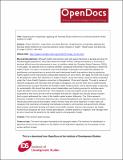Expecting the unexpected: applying the Develop-Distort Dilemma to maximize positive market impacts in health
Date
2012-08-12Author
Bennett, Sara
Paina, Ligia
Peters, David H
Metadata
Show full item recordImpact
Abstract
Although health interventions start with good intentions to develop services for disadvantaged populations, they often distort the health market, making the delivery or financing of services difficult once the intervention is over: a condition called the ‘Develop-Distort Dilemma’ (DDD). In this paper, we describe how to examine whether a proposed intervention may develop or distort the health market. Our goal is to produce a tool that facilitates meaningful and systematic dialogue for practitioners and researchers to ensure that well-intentioned health interventions lead to productive health systems while reducing the undesirable distortions of such efforts. We apply the DDD tool to plan for development rather than distortions in health markets, using intervention research being conducted under the Future Health Systems consortium in Bangladesh, China and Uganda. Through a review of research proposals and interviews with principal investigators, we use the DDD tool to systematically understand how a project fits within the broader health market system, and to identify gaps in planning for sustainability. We found that while current stakeholders and funding sources for activities were easily identified, future ones were not. The implication is that the projects could raise community expectations that future services will be available and paid for, despite this actually being uncertain. Each project addressed the ‘rules’ of the health market system differently. The China research assesses changes in the formal financing rules, whereas Bangladesh and Uganda’s projects involve influencing community level providers, where informal rules are more important. In each case, we recognize the importance of building trust between providers, communities and government officials. Each project could both develop and distort local health markets. Anyone intervening in the health market must recognize the main market perturbations, whether positive or negative, and manage them so as to maximize the benefits to the health system and population health.

